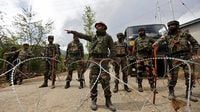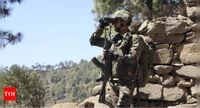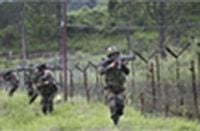The Indian Army reported that the Pakistan Army violated the ceasefire agreement on April 1, 2025, by intruding across the Line of Control (LoC) in the Krishna Ghati sector of Poonch district, Jammu and Kashmir. This incursion was characterized by unprovoked firing, which prompted a swift response from Indian forces.
According to Lt Colonel Suneel Bartwal, a spokesperson for the Indian Army, the incident occurred at approximately 1:10 PM. He stated, "On April 1, a mine blast occurred in Krishna Ghati Sector due to Pakistan Army intrusion across LoC. This was followed by unprovoked firing and ceasefire violation by Pakistan Army." The Indian troops reacted in a controlled and calibrated manner, ensuring that the situation remained under control and was closely monitored.
Despite the tension, no casualties were reported on the Indian side. However, official sources indicated that five enemy soldiers were injured as a result of the explosion and the subsequent exchange of fire. The Nangi Tekri Battalion, operating under the Krishna Ghati Brigade, played a pivotal role in the Indian Army's response to this unprovoked attack.
The Indian Army has emphasized its commitment to maintaining peace along the LoC, reiterating the importance of upholding the 2021 understanding reached between the Director Generals of Military Operations (DGsMO) of both countries. This agreement aimed to address and mitigate concerns that could lead to violence along the border.
This recent ceasefire violation comes just a month after another breach by Pakistani soldiers in the same region, reflecting ongoing tensions despite previous agreements for peace. Notable past violations include a September 11 incident that resulted in the death of a Border Security Force (BSF) trooper in Akhnoor, and a November 2023 incident where an Indian soldier was fatally shot by Pakistan Rangers in Samba.
In addition to the ceasefire violations, security forces are currently engaged in a significant operation against militants in the Panjtirthi area of Kathua, following an exchange of fire with terrorists on the night of March 31. This operation, which involves collaboration between the Indian Army, Jammu and Kashmir Police, and the Central Reserve Police Force (CRPF), was initiated after suspicious movements were detected in the region.
Early on April 1, a fresh encounter occurred as security forces launched a search-and-destroy operation at first light. The Rising Star Corps of the Indian Army confirmed the ongoing operations, stating, "Acting on intelligence inputs, multiple surveillance cum ambushes were deployed in general area Panjtirthi, Kathua by Indian Army, JK Police and CRPF. Suspicious movement was observed on the night of March 31, leading to an exchange of fire. Search and destroy operations launched at first light on April 1. Operations in progress."
Authorities have maintained a heightened alert in both Poonch and Kathua, with the situation being closely monitored as security forces continue their operations against the militant group believed to have entered the Kathua district after crossing the international border with Pakistan.
The Indian Army remains vigilant and prepared to respond to any further violations or threats, underscoring its commitment to safeguarding national security and maintaining peace along the Line of Control. The situation continues to evolve as both military and law enforcement agencies work to address the challenges posed by militant activities in the region.
As the Union Home Minister Amit Shah is scheduled to visit Jammu and Kashmir on April 7-8, the ongoing operations and recent ceasefire violations highlight the complexities and tensions that persist in this sensitive border area.
In summary, the incident on April 1 serves as a stark reminder of the fragile state of peace along the LoC, as both nations grapple with the repercussions of past agreements and the ongoing threat of violence. The Indian Army's prompt response reflects its readiness to counter any aggression while adhering to the tenets of peace established in previous diplomatic engagements.








